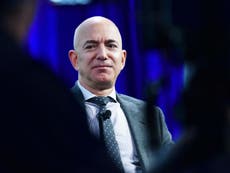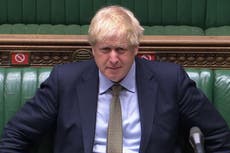It’s time to fight the rising corruption in Boris Johnson’s government of cronies
We are sliding fast to the kind of governance we have for decades condemned overseas – cronyism, the bypassing of rules, and the creation of guard rails against transparency, openness and accountability


The UK, even with the MPs’ expenses scandal, has a reputation for having among the cleanest politics in the world. There are legislators abroad who looked at the furore over moat houses and furnishings in second homes, and snorted, “Call that corruption?”
But on Boris Johnson’s watch, we are sliding fast into the kind of governance that we have condemned overseas for decades – cronyism; the bypassing of rules designed to prevent corruption; the erection of guard rails against transparency, openness and accountability; the use of “move on, nothing to see here” whenever difficult questions arise.
The latest example concerns the revelation by the acting permanent secretary in the Department for Business that the business secretary, Alok Sharma, overrode the concerns of senior officials when the government took a £400m stake in the now-bankrupt satellite company OneWeb.
The letter from Sam Beckett (for whom doubtless the same fate now awaits as was meted out to ousted cabinet secretary Mark Sedwill, ousted Foreign Office permanent secretary Simon McDonald, and ousted Home Office permanent secretary Philip Rutman) made clear that while there might have been opportunities from the purchase, “the central case is marginal”. Further, the chances of the UK losing its entire stake were high, and there were severe doubts that the investment met Whitehall’s (pre-Johnson) strict value-for-money requirements. Sharma ignored the warnings. Taxpayers’ money, almost half a billion pounds, has been spaffed up a wall.
As with many of the government’s money-wasting schemes, Dominic Cummings is close to this one. He has advocated “high risk, high reward” investments, and the OneWeb deal was aimed at compensating for the loss of access to the EU’s Galileo programme after the Johnson-Cummings-Gove, lies-driven, Russian-backed act of national self-harm known as Brexit.
The value of state contracts for work related to the Covid-19 crisis and given without proper competitive tender is now well over the billion-pound mark.
It comes as no surprise that one of the smaller contracts, worth just under £1m and signed off by Cabinet Office minister Michael Gove, was to test “the government’s coronavirus messaging”, with a side order of testing messaging on “EU exit” – the one thing the Johnson government actually cares about.
Now put to one side whether taxpayers should pay for nightly focus groups (no, they shouldn’t), and take a look at who got the contract. A company called Public First, owned by married couple James Frayne and Rachel Wolf. Frayne was Gove’s director of communications at the Department for Education, alongside political adviser Cummings. And guess whose “charity” got a nice half-million-quid contract to help Gove pursue his “free schools” plan? Rachel Wolf. That’s 20 new teachers’ starting salaries to you and me. Still at least it gave Wolf enough security to free up the time needed to help write the Tories’ 2019 election manifesto, and get that oven-ready Brexit deal centre stage.
The pattern pre-dates Covid-19. Remember Chris Grayling’s multimillion-pound contracts to a ferry company that didn’t build ferries? That’s Grayling, as in the man Johnson-Gove-Cummings wanted as chairman of the Intelligence and Security Committee.
Covid-19 has seen a contract given to a pest control firm for supplying surgical gowns (£32m), an employment agency (assets £623) supplying face masks (£18m), and a confectionery wholesaler’s contract for PPE (£100m). It’s peanuts compared with the quarter of a billion for medical equipment that went through a “family office” (sounds nice) registered in Mauritius that deals in private equity, currency trading and offshore property. I wonder if any of them bid for tennis matches with Boris Johnson to boost Tory Party coffers, or is that a perk reserved for Russian oligarchs?
Of course it’s not just Russians who fund the Tory Party. Randox Laboratories has given them £160,800 over the years, small change set alongside the £133m Covid-19 testing contract they “won”, and surely Vote Leave MP and former cabinet minister Owen Paterson can expect a bonus on top of his six-figure consultancy fee?
At the height of the Cummings’ lockdown breach furore, I collated hundreds of letters from Tory MPs replying to constituents complaining about his conduct. You can read them all on my website, but if I had to summarise the line to take, it was, “I understand your anger, but he acted as any dad would – cops not taking it further, PM happy, move on.”
Someone called Tim Cave sent me his exchange with David Johnston, MP for Wantage, after he complained about the Public First contract.
Johnston’s reply: “I understand your concern, but at times people who run the best companies will be related to or friends with people in government, but they’ll get the contracts because they are best suited rather than because of the connections.”
Cummings could not have put it better himself. “Nothing to see here. Yeah, they are cronies, but this is a crisis. Move on.”
We now have a government whose prime minister does not believe Russian interference in our democracy is worthy of investigation, a government that does not believe well-established anti-corruption procurement rules matter, and Tory MPs unconcerned about both.
I remind you of the seven Nolan principles governing public life that I wrote about here recently. Honesty. Openness. Integrity. Selflessness. Objectivity. Accountability. Leadership.
In responding to my call for the Committee on Standards in Public Life to become more proactive, its chairman, Lord Evans, said I made strong points, but he was at pains to say his committee does not investigate cases; they merely advise on how systems of government should operate ethically. However, the systems are being deliberately broken down by government. So whose responsibility is it to take the lead in protecting and repairing them? Surely his committee has to play a part? So does the Commons Speaker, who witnessed more lies from the prime minister yesterday. So do the opposition, who need to fight rising corruption much harder.
Too many people are still doing politics according to the “good chaps” approach when thoroughly bad people have taken control of government, in which standards are rotting from the top, and the British taxpayer is being taken for an increasingly corrupt ride.





Join our commenting forum
Join thought-provoking conversations, follow other Independent readers and see their replies